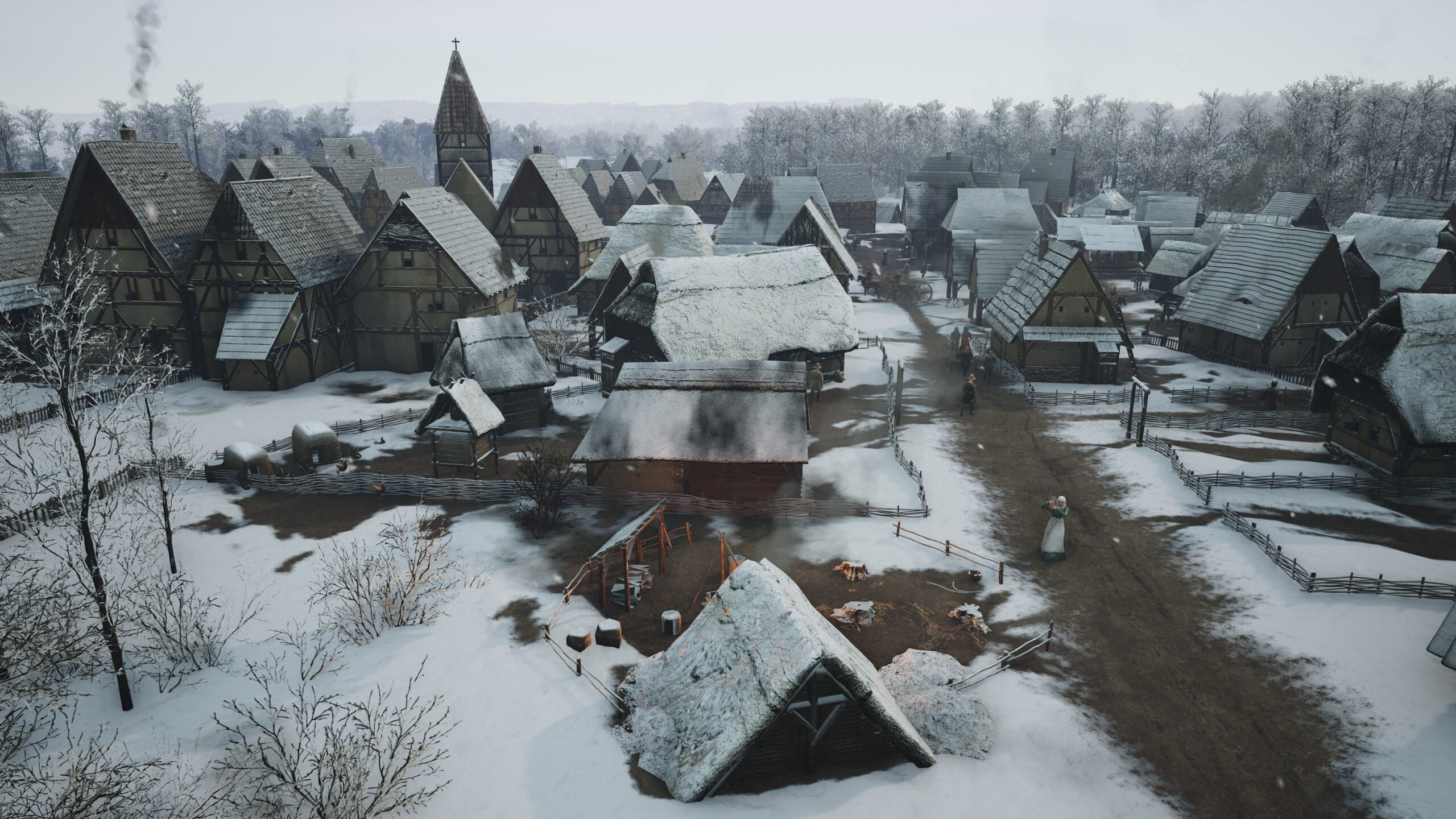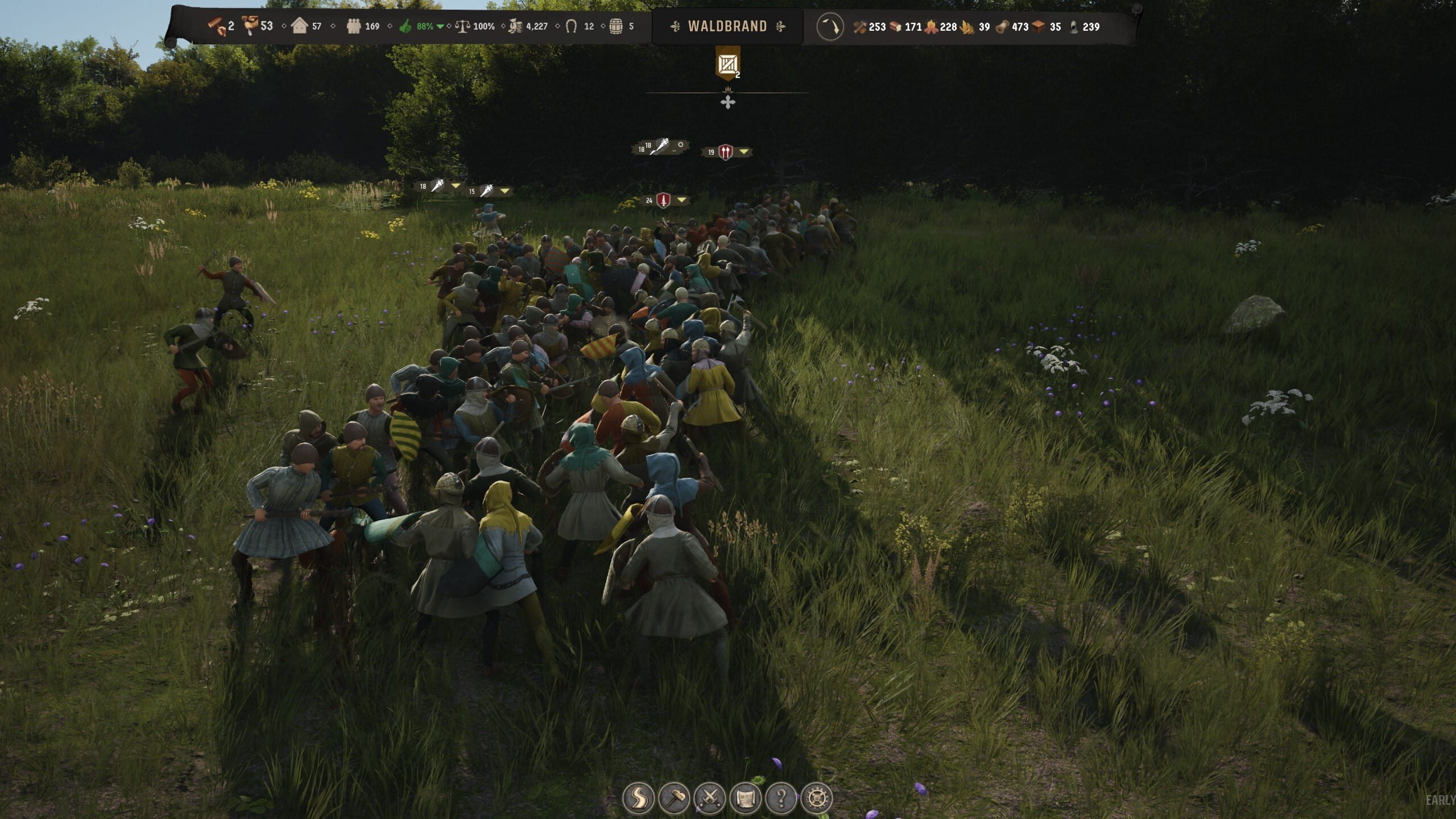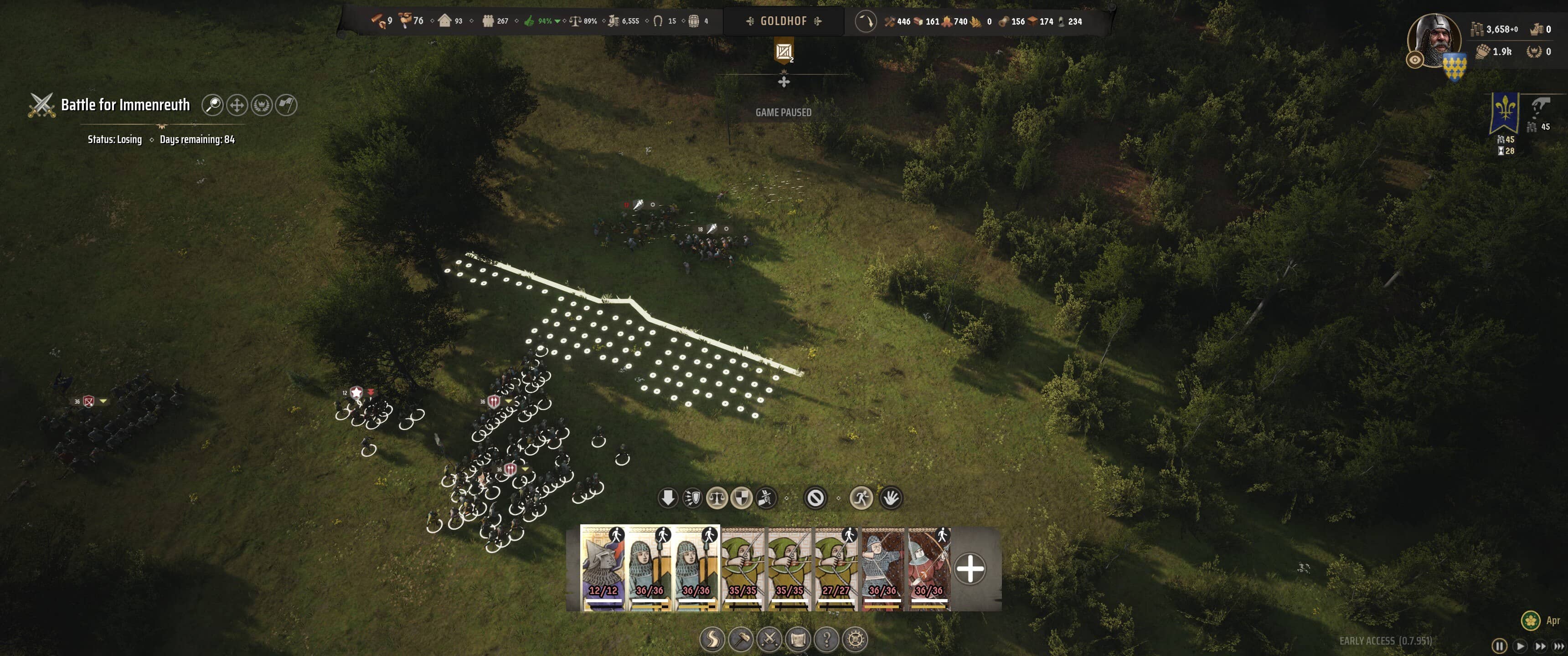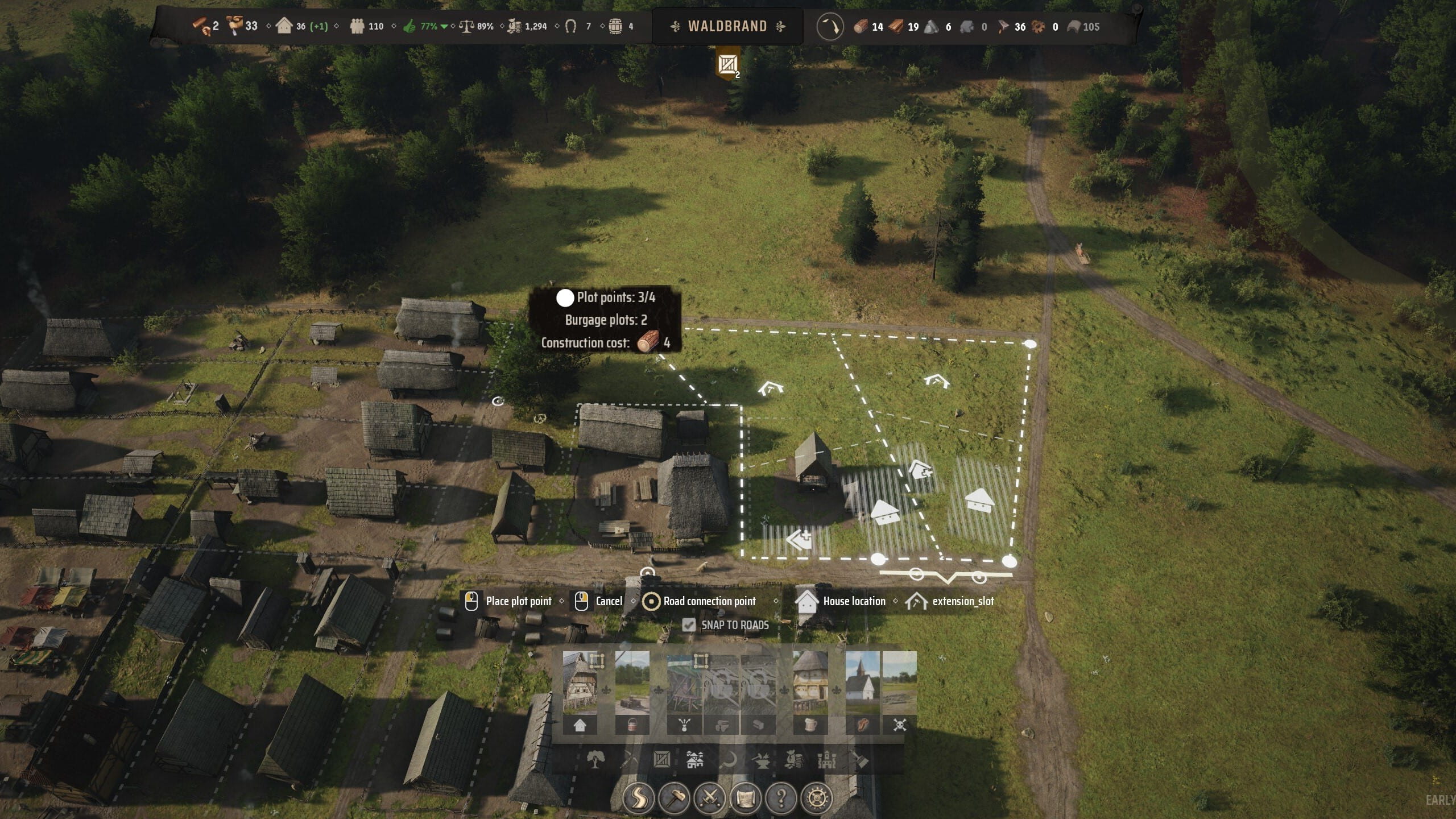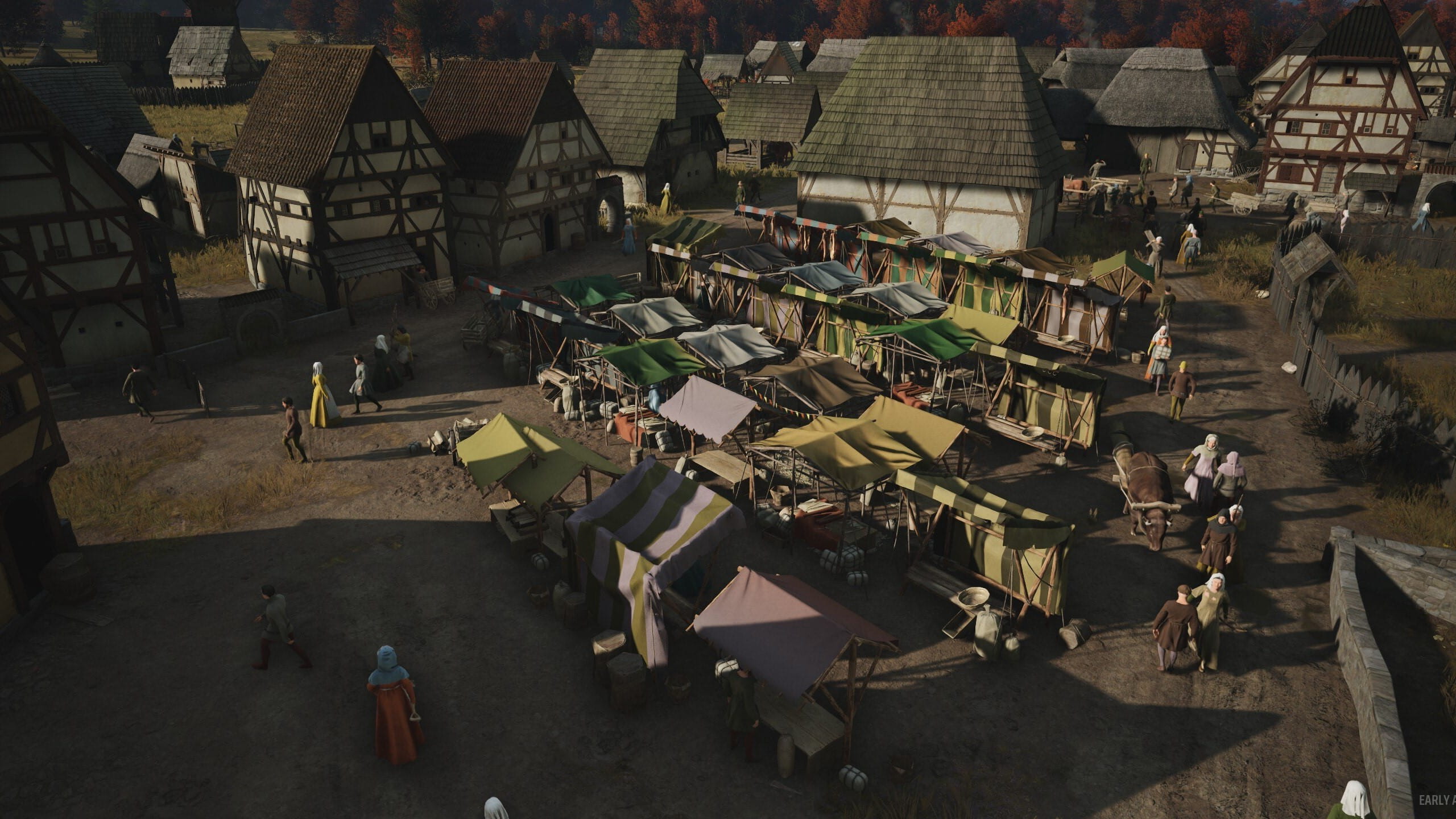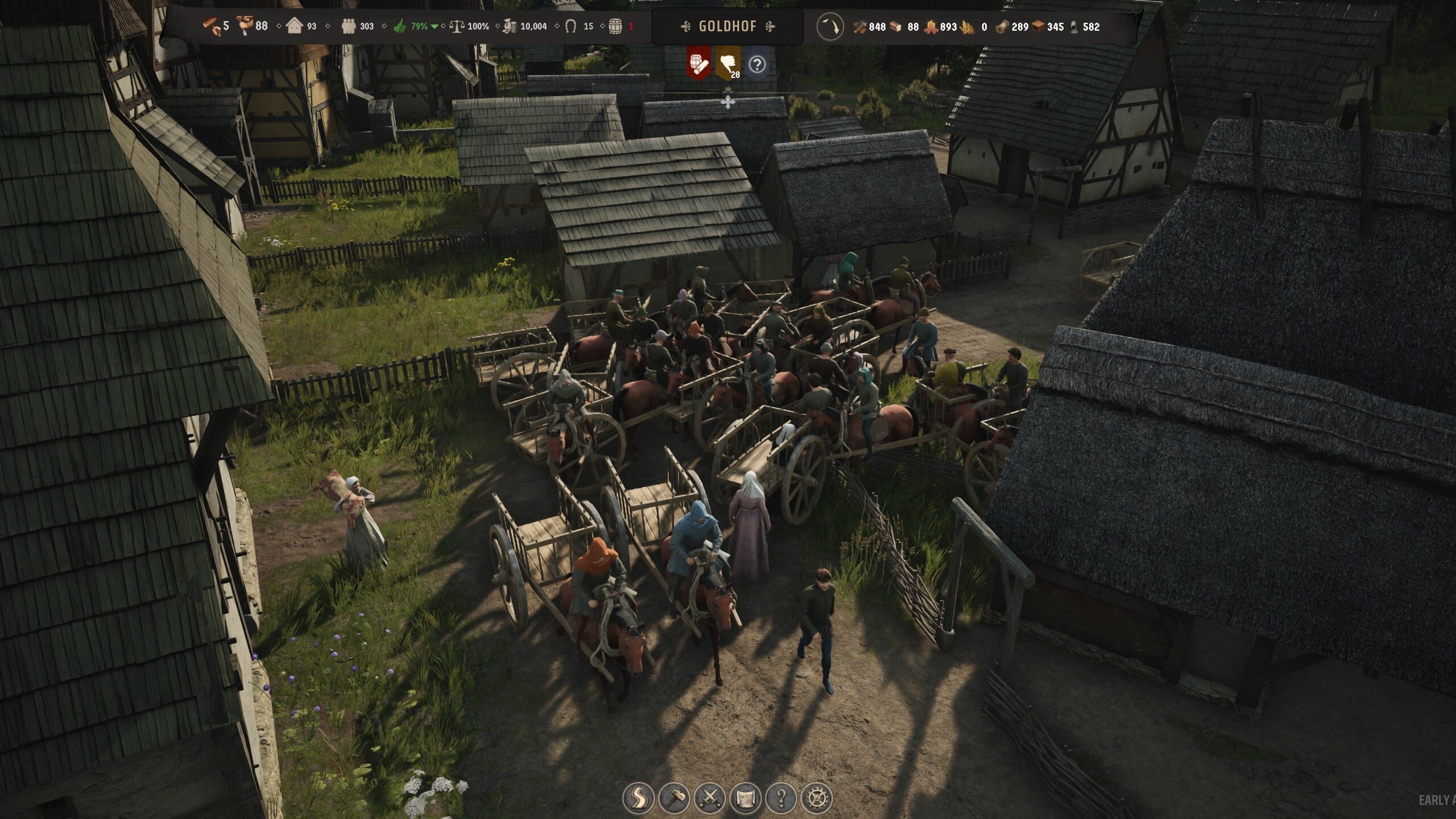Curious about 'Manor Lords'? It's the most addictive city-builder I've ever played — it's coming to PC Game Pass too.
I'm not even a huge fan of its genre, but Manor Lords has me absolutely hooked.
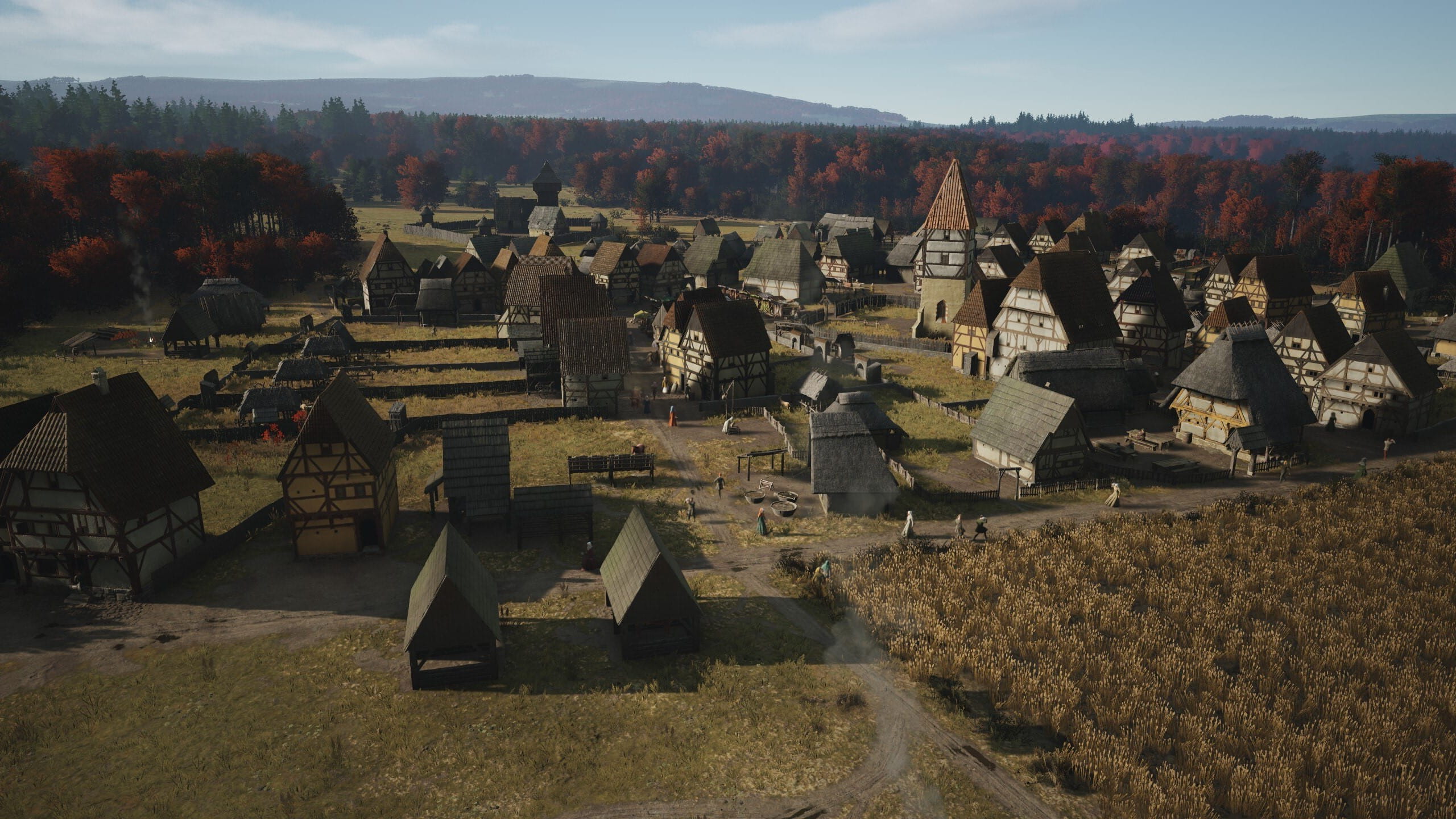
All the latest news, reviews, and guides for Windows and Xbox diehards.
You are now subscribed
Your newsletter sign-up was successful
• Gameplay
• Presentation
• Performance
• Conclusion
The most wishlisted game on Steam right now, Manor Lords, is finally here — and it's been a long time coming. Slavic Magic solo developer Greg Styczeń has been building the indie for seven years, with hype for it swelling after a team-up with publisher Hooded Horse and the release of a popular demo during the 2022 October Steam Next Fest. Now, the ambitious medieval city-builder is just a few days away from launching publicly in Early Access on Steam, GOG, and the Microsoft Store, and you'll be able to jump into it with PC Game Pass, too.
I've had access to a pre-release build of the game for review during these last few weeks, and even though I wouldn't exactly call myself a city-builder guy, I've been having a grand time with it. It's not without problems — it can be a bit obtuse at times, for example, and I've run into a few bugs that've caused issues for my peasants — but overall, it's one of the most addicting games I've played in recent memory, with finely tuned systems, satisfying progression curves, and engaging strategic battles on the side.
This Early Access review was made possible by a Steam code provided by Hooded Horse and Slavic Magic. The contents of this review were not shared with these companies prior to publication.
Manor Lords review: City gameplay and army battles
Though Manor Lords gives you three different options for scenarios to play through — peaceful growth, a lengthy campaign of conquest, or a race to build up defensive armies as raiders close in — they all begin the same way: with basic tents on a plot of land, five families ready to be assigned work, and just enough timber and food to get your settlement started. Beyond that, it's up to you to gather additional materials, designate burgage plots, and raise your settlement through freeform building mechanics (most of my structures looked grid-like anyway, because I'm boring) and commercial expansion.
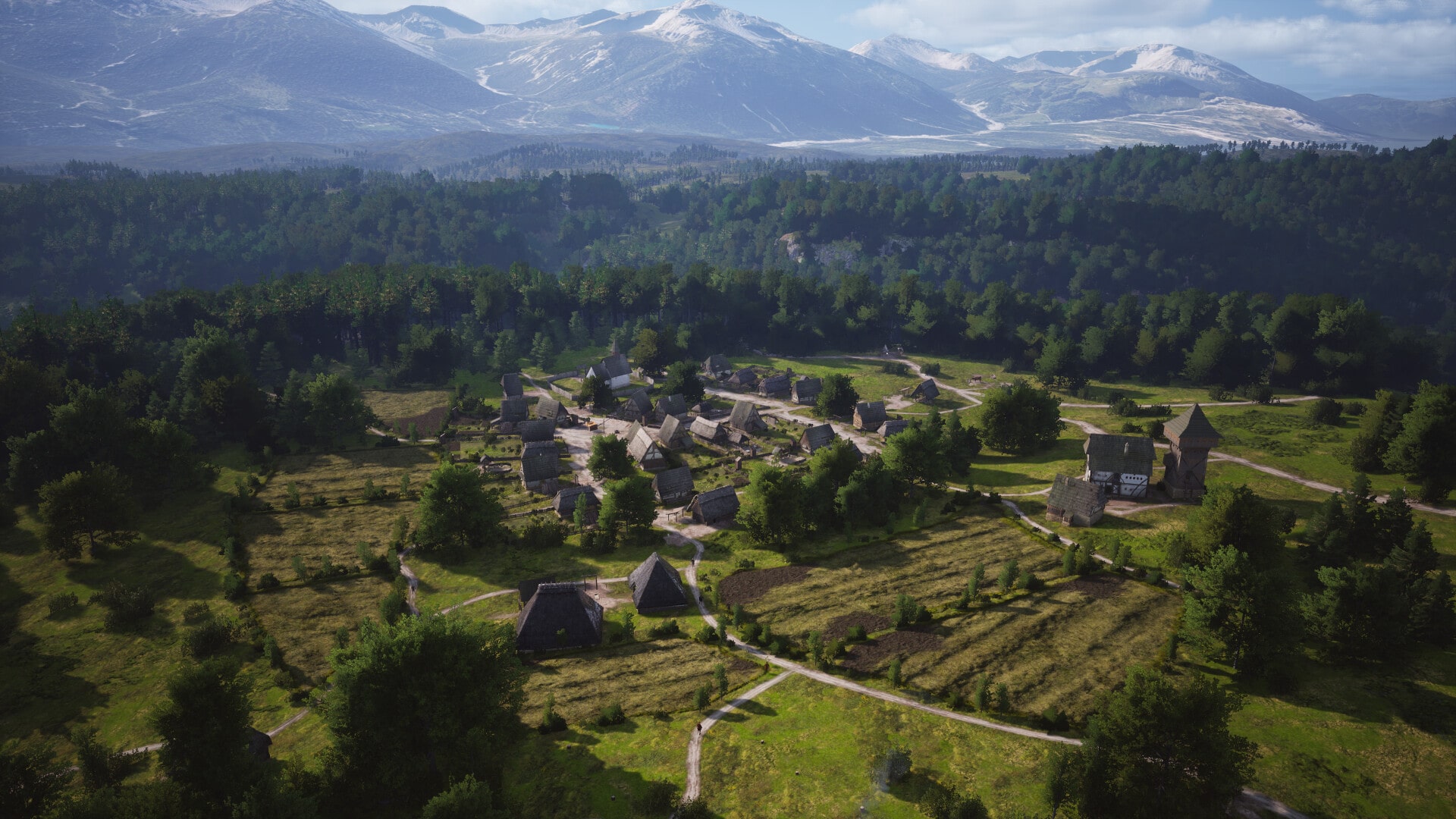
Developer: Slavic Magic
Publisher: Hooded Horse
Genre: City-builder / Strategy
Release date (Early Access): April 26, 2024
Platforms (Early Access): Windows PC (Steam, GOG, Microsoft Store)
Reviewed on: PC (Steam)
Xbox Game Pass: Yes (PC Game Pass)
Learn more: Manor Lords FAQ
The journey from humble beginnings to sprawling kingdom starts small, with lumber camps to fell and plant trees and grounds for hunters and berry gatherers to base out of. Then, once you've got the necessary resources, you build homes for your serfs, as well as a granary and a storehouse to stockpile your growing materiel. That leads to the development of a central marketplace where citizens can peddle their wares in the heart of your village; roads, which can be freely drawn at any time, are its veins. From there, your advancement continues exponentially, with various upgrades and new families moving in allowing you to develop new goods and services, which in turn leads to further population growth.
It's a progression loop all too familiar to fans of the genre, but Manor Lords really makes you work for it, and that's precisely what makes the payoffs meaningful. They come slowly, and only with careful management of and improvements for your resources, workforce, and logistical networks. You'll also need to be flexible and adapt to the pros and cons of your land; handy soil fertility UI elements and map icons show that you may only be able to grow certain crops in or harvest an abundance of one or two natural resources from the terrain you're on. Additionally, berries, trees, and crops can't be gathered or planted in the winter, so it's wise to temporarily order those workers to help with firewood instead (the rate at which it's burned doubles in these months, so you'll need plenty of it).
Not only do these limitations ensure that no two Manor Lords playthroughs feel the same, but they also drive you to trade what your land provides in spades for what it can't — and trade adds yet another layer to Manor Lords' rich management gameplay, with dynamic supply and demand challenging you to diversify the goods you're selling as much as possible so you're always making money while buying the resources you need to maximize progress. Indeed, trade is the largest growth accelerator in Manor Lords, and playing the market is one of the best ways to succeed in the late game.
Eventually, you'll get to the point where it's time to expand to other regions on the map and build entirely new settlements in them, which is where Manor Lords' battle system comes into play (you'll also need to defend yourself from brigand attacks from time to time, too). Using arms and armor you've either made yourself or purchased through trading, you can order your citizens to raise a militia and fight against bandits or troops serving the Baron — the off-screen rival that challenges you for control of the land. You can also use personal wealth accrued through taxation to hire mercenaries for monthly fees, and to employ a small, but extremely capable retinue of men-at-arms kitted out with heavy plate armor.
All the latest news, reviews, and guides for Windows and Xbox diehards.
Both you and the Baron can stake a claim to a province, which almost always leads to conflict unless you opt not to challenge (you can try to take the land later, but it will require more of the "Influence" resource gained from tithes paid to the church and victories against bandits). Once war for a region is declared, you have 90 days to amass your forces and send them to the specified battlefield location.
The combat itself is extremely similar to Total War, with a strong emphasis placed on positioning, troop formations (you can adjust these on the fly to react to incoming threats), and choosing when to order your men to press forward, form phalanxes, or fall back as battles unfold. Ultimately, it's pretty simple — the basic principle of "spearmen up front, archers in the back" will generally win you most fights as long as you're not significantly outnumbered or underequipped — but it's still good fun, and a nice change of pace to enjoy every so often between lengthy periods of city management.
What I like most about Manor Lords' skirmishes is the lasting impact they have. Losing a few men isn't a big deal, but heavy casualties from defeats or pyrrhic victories can plunge your fiefdom into economic recession. Every soldier killed in battle is also a lost farmer or craftsman, and having to deal with the consequences of that adds interesting twists to your playthroughs. You might have to temporarily pause much of your industrial production in the winter to ration firewood, or purchase additional food from traders to compensate for lost hunters and bakers.
On the whole, I'm in love with Manor Lords' gameplay, though I do think it can sometimes be rather opaque. Something I want very badly is some sort of broad economic overview panel, which the game currently lacks; this makes it difficult to figure out why resources aren't being produced or making it to your marketplaces for distribution in a large settlement with complex supply chains (hot tip: building an extra granary and storehouse or more workers to your existing ones has helped me with this often). Of course, it is in Early Access, and I expect helpful features like this will come to the game in time.
Indeed, as fantastic as Manor Lords is now, it's poised to get even better in the future. Many various development and policy options are locked since they're still a work-in-progress, and there's even a diplomacy system on the way for those that prefer to negotiate when possible (it's in the game now, but it's barebones and doesn't really affect anything). Perhaps we'll eventually get options like persuading brigands to serve in our militia if we threaten them with overwhelming force, or ways to trade plots of land with the Baron.
Manor Lords review: Visuals and presentation
Simply put, Manor Lords is a gorgeous game, especially for something that was almost entirely put together by a single developer. Its various structures and NPCs are some of the most detailed I've ever seen in a city-builder, and the beauty of its medieval European landscapes is accentuated by its natural lighting and color balance. The environment also changes as seasons come and go, with heavy spring rains, autumnal color shifts, and winter snowfalls highlighting the passage of time.
The game's presentation is very lifelike in general, with tons of comprehensive animations, NPC voice lines, and ambient sound effects selling the development and day-to-day hustle and bustle of your towns. You can watch in real time as serfs construct longhouses on their burgage plots, work at their jobs, and transport and sell their goods, and doing so is almost too satisfying — there have been a few times I was actually slow to address a problem because I was having fun watching my people go about their business with the game sped up.
There's also the soundtrack, comprised of a collection of orchestral themes that prominently feature fipple flutes, bagpipes, lutes, and other instruments of the era (this video on the creation of the score is a great watch). Much like the game world, it too changes dynamically over time, with spring and summer bringing catchy and cheerful music you'd hear in a bustling tavern and winter months begetting somber and melancholy melodies. Some of the tracks even get more energetic as your village grows, adding to the satisfaction of making hard-earned progress.
Manor Lords review: Early Access performance
It's not uncommon for Early Access games to (understandably) launch with lots of bugs and performance issues, but so far, I've had very few problems with Manor Lords. It runs well at 3440x1440 resolution with balanced DLSS and max settings, with the game getting a stable 100 FPS in smaller towns and battles and around 70-80 in larger ones on my i5-12600K/RTX 3070 rig with 32GB of DDR4 RAM. Aside from a few hitches in the seconds after I open my saves and the rare momentary framerate drop, it's been a smooth experience.

• Best Xbox / PC headsets in 2024
• Best upcoming Xbox / PC games
• Best Xbox controllers
• Best Xbox accessories
• Best small gaming PCs
• Best gaming laptops in 2024
The game also doesn't have too many bugs, though I have noticed a few. Specifically, I've had my townsfolk inexplicably stop selling food at their marketplace stalls, forcing me to demolish them so they could be rebuilt and reset before everyone in my city began starving. I've also seen supply wagons bunch up in roads while the game speed is increased, freezing your trade operations until the AI figures out how to "clear the blockage." Very rarely, workers may also stop carrying out their daily tasks despite having the necessary materials and logistical support, forcing you to either demolish and rebuild their workplace or save and reload the game.
Overall, these glitches are few and far between, but they're nevertheless vexing and can lead to confusion about why there's something wrong in your village. If you're having issues staying supplied with food or another important resource and you can't figure out what the problem is, try restarting the game — it could be a bug like one of these.
Manor Lords review: Final thoughts
Manor Lords may be an Early Access release, but it already feels like a full, complete game — and with its developer planning to expand it with additional upgrade paths, some extra gameplay systems, and a full-fledged diplomacy mechanic, things can only go up from here. Despite a few confusing elements and a handful of annoying bugs, it ultimately stands tall as one of the best new games of 2024, as well as one of the best PC games for city-builder and strategy fans.
Notably, Manor Lords is launching onto PC Game Pass (and Xbox Game Pass Ultimate, by extension) when it comes out on April 26, so you can play it that way if you subscribe to the service. Of course, it's also releasing on Steam and GOG, and is headed to Xbox and Xbox Game Pass at some point in the future as well.
Manor Lords (PC) | $39.99 $29.99 at GOG
Greg Styczeń's highly anticipated city-builder Manor Lords is finally here, and it's just as amazing as everyone was hoping it'd be. I'm not even a huge fan of the genre, but it's absolutely hooked me with its addictive gameplay loops, and I'm confident you're going to love it, too.
See at: Microsoft Store | CDKeys (Steam) | Steam

Brendan Lowry is a Windows Central writer and Oakland University graduate with a burning passion for video games, of which he's been an avid fan since childhood. He's been writing for Team WC since the summer of 2017, and you'll find him doing news, editorials, reviews, and general coverage on everything gaming, Xbox, and Windows PC. His favorite game of all time is probably NieR: Automata, though Elden Ring, Fallout: New Vegas, and Team Fortress 2 are in the running, too. When he's not writing or gaming, there's a good chance he's either watching an interesting new movie or TV show or actually going outside for once. Follow him on X (Twitter).
